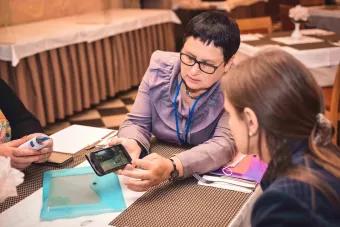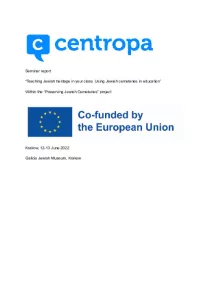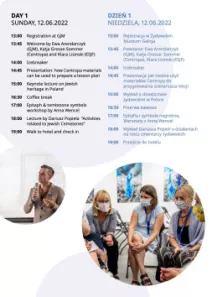
The EU3 seminar for Polish teachers focused on imbuing Polish educators with the tools and knowledge to use Jewish cemeteries in their classroom. After introducing Centropa materials and how they can be used in the classroom, the keynote by Prof. Dr. Edyta Gawron on Jewish heritage in Poland focused on material and immaterial heritage. A workshop on reading epitaphs and tombstone by Anna Wencel from Galicia Jewish Museum was followed by a presentation by activist Dariusz Popiela on his foundation’s activities related to preserving Jewish cemeteries. The second day included a guided tour and excursion to the Jewish cemetery of nearby town of Brzesko by Bartosz and Anna Wencel, followed by group work on developing lessons plans on how to use Jewish cemeteries in the classroom. A final lecture by Prof. Dr. Krzysztof Bielawski on the situation of Jewish cemeteries in Poland, and a presentation of student projects carried out on Polish Jewish cemeteries wrapped up the seminar.
The EU3 seminar for Polish teachers focused on imbuing Polish educators with the tools and knowledge to use Jewish cemeteries in their classroom. After introducing Centropa materials and how they can be used in the classroom, the keynote by Prof. Dr. Edyta Gawron on Jewish heritage in Poland focused on material and immaterial heritage. A workshop on reading epitaphs and tombstone by Anna Wencel from Galicia Jewish Museum was followed by a presentation by activist Dariusz Popiela on his foundation’s activities related to preserving Jewish cemeteries. The second day included a guided tour and excursion to the Jewish cemetery of nearby town of Brzesko by Bartosz and Anna Wencel, followed by group work on developing lessons plans on how to use Jewish cemeteries in the classroom. A final lecture by Prof. Dr. Krzysztof Bielawski on the situation of Jewish cemeteries in Poland, and a presentation of student projects carried out on Polish Jewish cemeteries wrapped up the seminar.
Quotes
“I am considering organizing a project on my local Jewish cemetery. The seminar helped me organize my thoughts and ideas anew. My project could be about collecting materials and doing something like archiving data about a cemetery and publishing a folder or brochure that could be used as educational material. I would also like to get more people interested in the subject of this cemetery, because it takes people and resources to prevent it from falling into ruin.”
“Thanks to this seminar and (for me), above all, very valuable and extremely reliably prepared lectures by Mrs. Anna Wencel and a guided tour of the cemetery by Mr. Wencel, I have the feeling that I can organize a trip for students to our local cemetery.”
“I was very interested in the epitaphs and symbolism placed on the matzevot, and during the seminar I was working on a script using this knowledge, now I am going to implement the script during classes with young people. I am most interested in the community of human experiences and thoughts, regardless of their origin and culture - cemeteries turn out to be a good point of reference for such issues - they refer to the memory of Jews and their cultural heritage.”
“A cemetery is the base for any work that can be done on Jewish history, because in my city it is the only material object related to the history of the Jews which survived and did not change its purpose. Therefore, it is a very important foundation both in teaching the culture of remembrance, as well as in education about local history and education about the Holocaust and multicultural education.”
We want to thank our supporters, the European Commission, for making this seminar possible.


